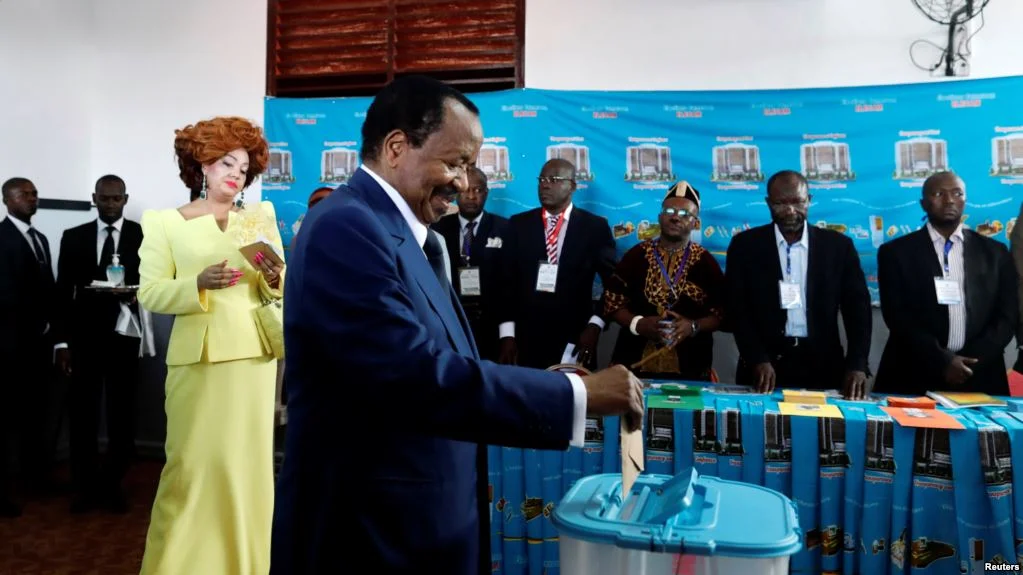Fifteen days after Cameroon’s presidential election concluded, the country’s Constitutional Council unsurprisingly declared that 85-year-old Paul Biya had been re-elected for a seventh seven-year term. Now wearing the crown of ‘Africa’s oldest dictator,’ the end result was really never in doubt.
But despite winning with a miraculous 71% of the vote, President Biya’s external legitimacy is perhaps at the lowest level of his 36-year reign.
Due in large part to the government’s handling of unrest in the country’s English-speaking regions – where hundreds have been killed and thousands more displaced – Biya’s traditional Western allies have become vocally uneasy with his repressive actions. There have been public hearings in the U.S. Congress, and prominent international organizations have shined a light on the Anglophone crisis, including Amnesty International and the International Crisis Group.
And so, despite being awarded a healthy majority of the vote, this time around there seemed to be a truly viable opposition candidate in Maurice Kamto, who formed a coalition with another high-profile candidate, Akere Muna, days before the poll. While the opposition remained largely fractured, it is a far cry from the 23 candidates that sought the same office in 2011.
In the wake of this year’s election there was also significant pushback from Cameroonian citizens, many of whom saw the polls as fundamentally compromised. Lawyers from a number of opposition political parties filed petitions with the Constitutional Council – the body with final say on the country’s elections – concerning a number of issues, from electoral fraud to a petition for the nullification of the results. The proceedings were televised on local television, as well as on the Internet, sparking widespread attention, including within Cameroon’s diaspora, which has been growing in strength in recent years.
Hashtags concerning the proceedings were trending on social media throughout the deliberations. CRTV, the state broadcaster, received hundreds of thousands of views on its Facebook stream alone. The final rulings, however, ultimately favored Paul Biya, the man who had handpicked each of the Council’s members. In a perhaps thinly veiled transaction, two days after the court’s ruling, the government began soliciting bids for a new USD$475,000 house for the Council president.
The Council’s declaration has not quieted the brewing storm. This past weekend, hundreds of people took to the streets of Cameroon’s economic capital, Douala, to call for Biya to step down. Influential religious leaders are also speaking out. Predictably, the government has responded by arresting dozens of people, including prominent opposition figures, like Michele Ndoki, a lawyer for Maurice Kamto’s party, who argued their case at the Constitutional Council. Images of her arrest, and being pushed into a street gutter by police, went viral online. While she has since been released, many more still languish inside prison cells.
Despite the upheaval, and the uncertainty that lays ahead, Cameroonians are pushing back on Paul Biya’s despotic rule in a newly profound way. While a protest movement may not topple the regime tomorrow, the next generation of Cameroonian leaders are making themselves known, and heard, as a force to be reckoned with.
Importantly, dictators like Paul Biya - in Africa and elsewhere - derive untold strength from the external legitimacy that is provided by Western allies. If war continues to be waged against Anglophones, while locking up an increasing number of political opponents, Biya may soon find that legitimacy in short supply.
Christian Freymeyer is a writer, researcher, and Master’s degree candidate at the Johns Hopkins University School of Advanced International Studies. He served in the Peace Corps in Cameroon from 2011 to 2013.
DISCLAIMER: The views expressed in this publication do not necessarily reflect the views of Vanguard Africa or the Vanguard Africa Foundation.

